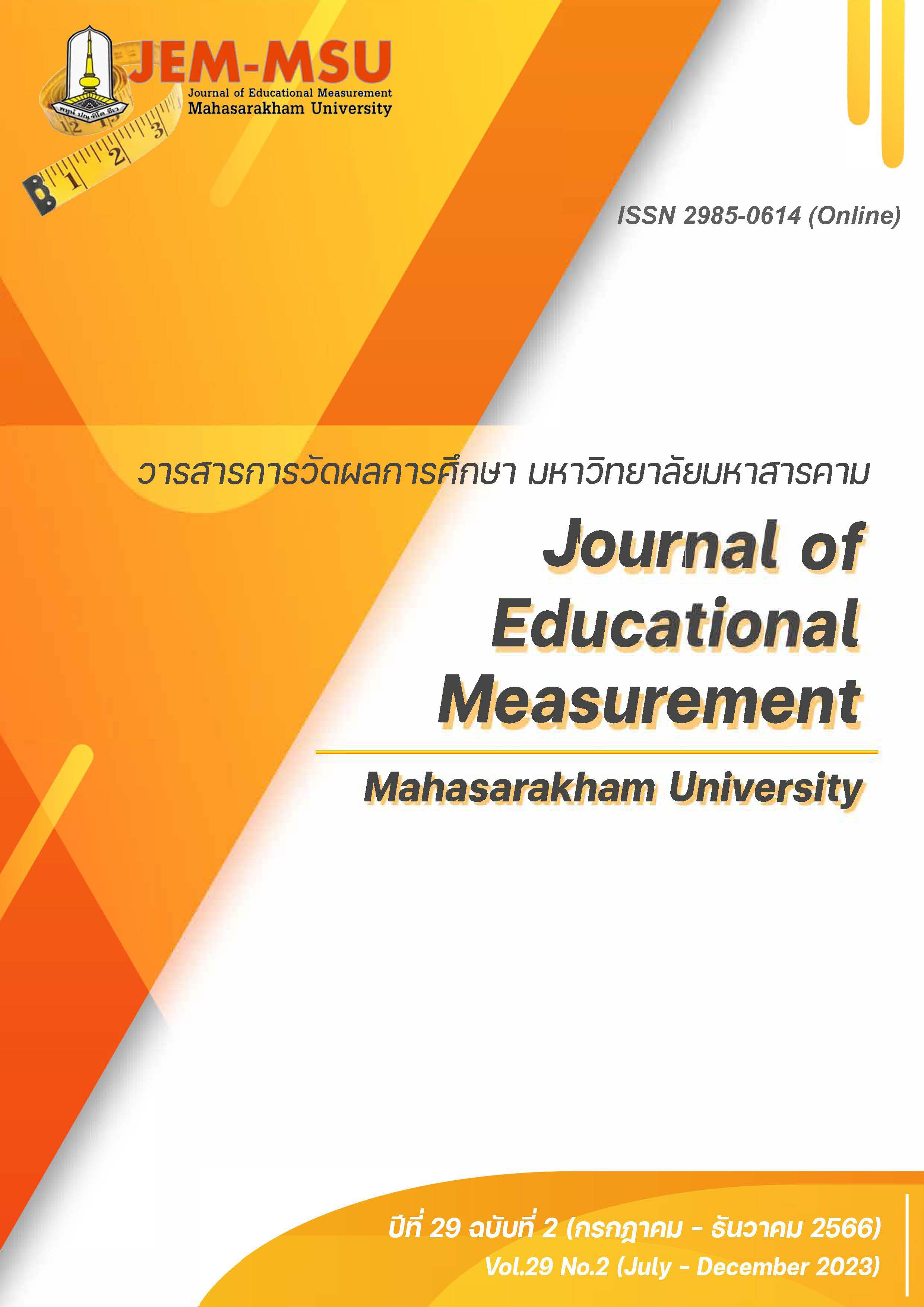Needs Assessment for Digital Assessment Literacy of the Elementary School Teachers of Watthatthong School under Vadhana District Office, Bangkok
Main Article Content
Abstract
The objectives of this study were to (1) analyze and rank the needs for digital assessment literacy of the elementary school teachers’ of Watthatthong School, under Vadhana District Office, Bangkok, and (2) compare the needs for digital assessment literacy of the teachers of the same school but with different backgrounds. The population consisted of 42 teachers of Watthatthong School under Vadhana District Office, Bangkok. The tool was a 5-point rating scale questionnaire. The statistics employed in the analysis of data were descriptive statistics: frequency, percentage, mean and standard deviation. The modified priority needs index (PNImodified ) was also used.
The results were as follows:
1. The findings revealed that the needs for digital assessment literacy of the teachers of Watthatthong School under Vadhana District Office, Bangkok, were at the highest level, and the current state of the teachers' collective digital assessment literacy was at the high level. When the teachers' digital assessment literacy needs were classified into 3 steps, they were: (1) basic digital assessment literacy (PNImodified = 0.33); (2) intermediate digital assessment literacy (PNImodified = 0.29) and (3) advanced digital assessment literacy (PNImodified = 0.27)
2. Teachers with different backgrounds needed different digital assessment literacy as follows: (1) The teachers with master's degrees had their priority need index higher than the teachers with Bachelor's degrees or graduate diplomas; and (2) Teachers with 11 years, or more, of experience had their priority need index higher than the teachers with 1-10 years of experience.
Article Details

This work is licensed under a Creative Commons Attribution-NonCommercial-NoDerivatives 4.0 International License.
The content and information contained in the published article in the Journal of Educational Measurement Mahasarakham University represent the opinions and responsibilities of the authors directly. The editorial board of the journal is not necessarily in agreement with or responsible for any of the content.
The articles, data, content, images, etc. that have been published in the Journal of Educational Measurement Mahasarakham University are copyrighted by the journal. If any individual or organization wishes to reproduce or perform any actions involving the entirety or any part of the content, they must obtain written permission from the Journal of Educational Measurement Mahasarakham University.
References
Eyal, L. (2012). Digital Assessment Literacy-the Core Role of the Teacher in a Digital. Environment. Educational Technology &Society, 15(2), 37-49.
Husain, F.N. (2021). Digital Assessment Literacy: The Need of Online Assessment Literacy and Online Assessment Literate Educators. International Education Studies, 14(10), 65-76.
Napanoy, J.B., & Peckley, M.K. (2020). Assessment Literacy of Public Elementary School Teachers in the Indigenous Communities in Northern Philippines. Universal Journal of Educational Research, 8(11B), 5693-5703. https://doi.org/10.13189/ujer.2020.082203
Stiggins, R.J. (1995). Assessment literacy for the 21st century. Phi Delta Kappan, 77(3), 238.
Watmani, R., Asadollahfam, H., & Behin. B. (2020). Demystifying Language Assessment Literacy among High School Teachers of English as a Foreign Language in Iran: Implications for Teacher Education Reforms. Tabaran Institute of Higher Education International Journal of Language Testing, 10(2), 129-144.
Bangkok Education. (2021). Educational Measurement and Evaluation in the New Normal. Evaluation for Educational Provision Group, Bureau of Academic Affairs Educational Standards, Educational Strategy office Bangkok Education. (in Thai)
Chumkaew, S. (2018). Needs Assessment of Teachers’ Assessment Literacy. Academic Services Journal Prince of Songkla University, 29(1), 88-94. (in Thai)
Konsanthia, K. (2022). The Need Assessment for Digital Competence Development of Secondary Science Teacher in Secondary Educational Service Area Office Saraburi. Journal of Rajanagarindra, 19(1), 9-16. (in Thai)
Lakthorng, S., & Kidrakran, P. (2020). The need assessment for digital literacy of teachers under the office of basic education commission. Journal of Social Science and Buddhistic Anthropology, 5(4), 234-248. (in Thai)
Nuansri, M., & Pantuworakul, K. (2020). Analysis of teacher’s Assessment Competency: A Case Study of the Central Region. Journal of Graduate Studies Valaya Alongkorn Rajabhat University, 14(3), 116-133. (in Thai)
Oonsapiv, J. & Nunthachaiya, S. (2021). Problems and Needs of Learning Management during the Covid-19 Situation at Watdan Samrong School Primary Educational Service Area Office Samutprakan District 1. Journal of Modern Learning Development, 6(4), 50-66. (in Thai)
Padungtin, N., & Phutiariyawat, J. (2022). Personal and Motivational Factors Affecting Digital Competency in Teachers Under the Secondary Educational Service Area Office Nakhon Pathom and Suphanburi. Silpakorn Educational Research Journal, 14(2), 126-142. (in Thai)
Sirum, U., Chaiso, P., Ekwarangkul. P., & Ugsonkid. S. (2020). Strategies of Assessment for Learning for Learners in the 21st century. Sripatum Review of Humanities and Social Sciences, 20(1), 193-206. (in Thai)
Thanasri, P., Sikkhabandit, S., & Sriprasertpap. K. (2022). the study of Components and Necessities of Measuring and Evaluating Learning Outcomes for basic Education Institutions. Journal of Educational Review Faculty of Education in MCU, 9(1), 263-275. (in Thai)
Thonghattha, M. (2021). The Situationof Online Learning Management during the COVID-19 Pandemic of Foreign Languages Department Teachers at Pakphanang School in Nakhon Si Thammmarat Province. Journal of lawasri Thepsatri Rajabhat University, 5(1), 43-51. (in Thai)
Wongweerakhan, W., Ketchatturat, J., & Thawinkarn. D. (2021) confirmatory factor analysis of measurement model of competencies on learning assessment of teachers at the basic education level. Journal of MCU Social Science Review, 11(3), 280-293. (in Thai)


